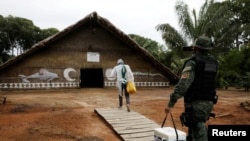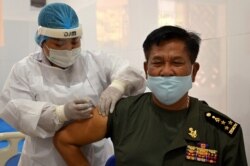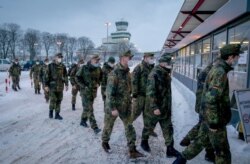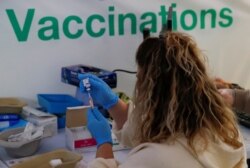The heads of the World Health Organization and the U.N. Children's Fund are appealing for scaled-up COVID-19 vaccine production and equitable distribution, warning that the global rollout is dangerously uneven.
"Of the 128 million vaccine doses administered so far, more than three quarters of those vaccinations are in just 10 countries that account for 60% of global GDP," said WHO chief Dr. Tedros Adhanom Ghebreyesus and UNICEF Executive Director Henrietta Fore in a joint statement on Wednesday. "As of today, almost 130 countries, with 2.5 billion people, are yet to administer a single dose."
If this continues, they warn, it "will cost lives and livelihoods," and create conditions for the virus to mutate and become resistant to vaccines. Global economic recovery will also be slowed.
The officials urged governments to look "beyond their borders" and devise a vaccine strategy that will both end the pandemic and limit the emergence of new variants.
They recommend immunizing front-line health workers and vulnerable persons in all countries first. The WHO and UNICEF chiefs also appealed to vaccine manufacturers to allocate their limited supply fairly and transfer technology to other producers that can help boost the global supply.
"COVID-19 has shown that our fates are inextricably linked," they said. "Whether we win or lose, we will do so together."
Race to vaccinate
Also Wednesday, the WHO's Strategic Advisory Group of Experts on Immunization issued interim guidance recommending the AstraZeneca and Oxford University COVID-19 vaccine for persons over age 65.
Several European countries, including Germany and France, have limited use of it to people between ages 18 and 64 because of insufficient data on elderly recipients.
The WHO experts said based on ongoing trials and vaccine effectiveness studies in countries that are using the AstraZeneca vaccine, it appears safe and effective for the older age group.
They also recommend an interval of 8 to 12 weeks between the two doses.
South Korea approved the AstraZeneca vaccine for emergency use for all adults starting February 26. But the announcement, made before the WHO recommendation was released, issued a precautionary warning for persons over aged 65.
On Sunday, South Africa raised doubts about the AstraZeneca vaccine when it suspended its vaccination campaign after a new study revealed it to be less effective against a variant of the virus found in South Africa.
The study, conducted by the University of the Witwatersrand in Johannesburg and not yet peer reviewed, concluded that the British vaccine offered only "limited protection against moderate forms of the disease caused by the South African variant, in young adults."
South African Health Minister Zweli Mkhize said Wednesday that the government would begin inoculating front-line health care workers with U.S.-based pharmaceutical giant Johnson & Johnson's one-dose vaccine as part of a limited study. The Johnson & Johnson vaccine has not been formally approved for use by any country, but the company says results of a late-stage clinical trial shows it is 85% effective in preventing serious illness, even against the South African variant.
COVID-19 therapeutic drug
Meanwhile, the U.S. Food and Drug Administration has granted emergency use for a new COVID-19 therapeutic drug developed by pharmaceutical company Eli Lilly.
The drug, which combines the monoclonal antibody drug etesevimab with the already-approved bamlanivimab, will be used for coronavirus patients who are at high risk of being hospitalized with a severe form of the disease.
Monoclonal antibodies are lab-engineered versions of highly targeted human antibodies chosen for their specific ability to neutralize viruses.
VOA's Margaret Besheer contributed to this report.








